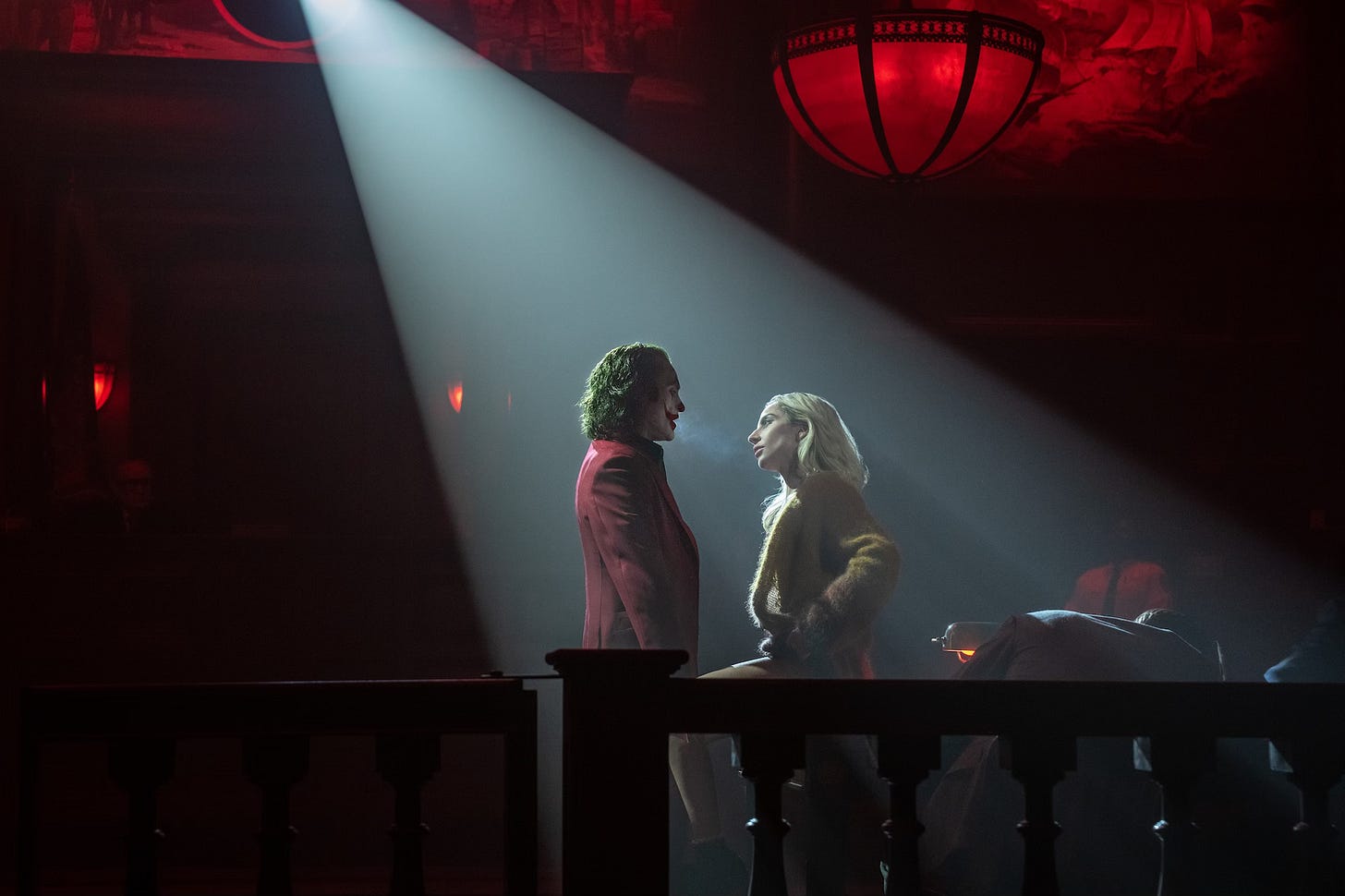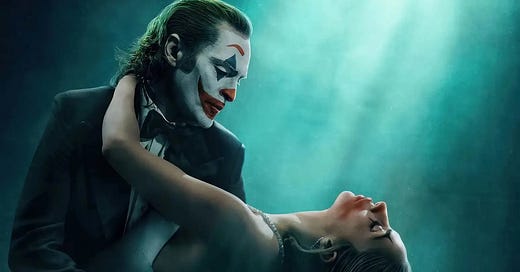‘Joker: Folie à Deux’ Holds Its Audience in Contempt
Todd Phillips’ sequel is part courtroom drama, part musical, and a total chore.
Today I’m pleased to present Matt Goldberg’s review of Joker: Folie à Deux. If you enjoy it, check out Matt’s other work at
. -David ChenBefore the release of 2019’s Joker, there was some handwringing online about whether the film would be too much. Could this dark and gritty take on a Batman villain inspire people to dark deeds? While this fear wasn’t completely unfounded after the Aurora Theater shooting in 2012, it also felt like it was building up Todd Phillips’ film based on its vibes rather than its content. When the film arrived, it made over a billion dollars at the worldwide box office, earned 11 Oscar nominations (including two wins), and had little social impact because Phillips’ supervillain film was largely ambivalent about everything. The film hints at weighty issues like mental illness, wealth inequality, and mass hysteria, but never comes to anything particularly deep or insightful. The film’s biggest takeaway is that people should be nicer to protagonist Arthur Fleck (Joaquin Phoenix).
The sequel, Joker: Folie à Deux (the title refers to a shared psychosis and means “madness of two”), picks up two years later with Arthur about to go on trial for murder. A brief animated sequence (and arguably the film’s highlight), done in the style of an old Looney Tunes cartoon, sets the thematic stage as well as the defense’s argument that Arthur suffers from a split personality. Arthur is the real guy, and Joker is the one who did those horrible things. While imprisoned, Arthur is medicated into almost a fugue state until he meets fellow patient Harley “Lee” Quinzel (Lady Gaga), who tells him how much she loves Joker. She awakens the dormant personality and Arthur/Joker thinks he’s finally found love, but this ends up making Arthur’s trial even more difficult as he mentally drifts off into musical numbers featuring him and Harley.

In an interview with Vanity Fair before the release of the first Joker, Phillips explained why he had left behind comedies like Old School and The Hangover to make a dark comic-book movie. “Go try to be funny nowadays with this woke culture,” Phillips said. “There were articles written about why comedies don’t work anymore—I’ll tell you why, because all the fucking funny guys are like, ‘Fuck this shit, because I don’t want to offend you.’” Phillips explained that he worked from a place of irreverence, and if audiences didn’t want his comedies, he would have to turn to another genre. “So I go, ‘How do I do something irreverent, but fuck comedy? Oh, I know, let’s take the comic book movie universe and turn it on its head with this.’ And so that’s really where that came from.”
Phillips seems like a guy with a pretty big chip on his shoulder, and that comes across in the first movie as the film’s real enemy is society but in a vague, “people should be nicer” kind of way. It melds Taxi Driver and The King of Comedy but without the focus or daring of either Scorsese film. Somehow, despite Joker’s success, Folie à Deus seems even more bitter than the movie you make when no one wants to see another Hangover sequel. Sending the movie to the courtroom to rehash Joker’s bad deeds from the first film is both condescending and pointless. I didn’t like Joker, but I can accept that people who did can embrace the character without seeing him as a role model. People love Darth Vader, but no one needs a Star Wars movie saying that it’s bad to choke your co-workers.
Not content to merely explain in tedious courtroom scenes that the noted Batman villain is villainous, we also get the musical numbers, which feel done to irk an imagined, hyper-masculine audience that thinks the Joker is awesome. But even here, Phillips lacks the courage of his convictions. Instead of flashy numbers we get limp, largely unadorned tunes from the Great American Songbook sadly sung by Phoenix and Gaga. Given the success of the first movie, Phillips likely would have had a blank check for lavish musical set pieces using original tunes, and instead, we get roughly the same energy from a sullen teenager who’s been forced to be in the school play. Musical numbers are supposed to reveal character or open up the narrative, but in Folie à Deux, they’re meandering interludes that only reiterate what’s obvious about Arthur. If I want to see a bunch of imagined musical numbers from an inmate on trial for murder who’s at the center of a media circus, Chicago is right there.
I’ve seen musicals and courtroom dramas done poorly, but never in the same movie, and certainly never to chastise the audience who liked another movie. By attempting to hector his fans, Phillips only reveals the shallowness of his original vision. Once you get past Phoenix’s performance (and there’s none of the unstable energy flowing through the actor this time around), Arthur isn’t that interesting, and working to split the character into Arthur/Joker sides reduces him down to the Hulk—you wouldn’t like Arthur when he’s angry. Perhaps if Phillips cared at all about Batman, he would have been onto something about why one traumatized child who becomes a violent adult lashing out at a broken society is treated as a hero while the other is put on trial for his life. But to get there, you’d have to dig into notions of privilege, wealth, and vigilante justice, and Phillips never cares to dig too deeply into anything.

His indifference towards thematic weight even makes its way into the craftsmanship of Folie à Deux. For all its narrative faults, the first Joker is visually stunning and has a killer, unnerving score. But because Folie à Deux is largely confined to prison cells and courtrooms plus a few musical numbers, Lawrence Sher’s cinematography is rendered dull and flat while Hildur Guðnadóttir’s music feels like it’s fighting with tunes from the mid-20th century. Every strength of the original gets stripped away, and in its place is a patronizing lecture about how you were wrong for being emotionally invested in the first place.
However, I can’t help but wonder how many people Phillips is addressing here. Joker’s contemporary comic book movies Black Panther, Captain Marvel, and Aquaman all made over a billion worldwide as well, and yet their sequels have all made at least $500 million less than their predecessors. What Phillips may fail to realize is that rather than his Joker existing as a societal force that must be restrained, it was merely part of a larger boom in comic book movies that has now subsided. There’s no genie to put back in the bottle because this wasn’t magic; it was the marketplace. That makes Phillips’ sequel somehow even more pathetic than its main character. It’s one thing to snipe at society; it’s even sadder when everyone else has moved on. -Matt Goldberg
Stuff Dave Chen Has Made
Over on Decoding TV, Patrick Klepek and I discussed what The Last of Us Season 2 might look like, based on the trailer. We’re also continuing our coverage of The Penguin on HBO — a show we both find entertaining but not particularly deep.
On The Filmcast, we reviewed Francis Ford Coppola’s Megalopolis. In my opinion, the film is a disaster, but there’s nothing else like it. Be sure to check out Stephen David Miller’s review of the film as well.
[PAID ONLY] On my personal Patreon, @joyofnapping and I discussed some of the stuff we’ve watched together recently, and what we plan to do about the fall Presidential election. Listen here.





The review confirms my suspicions, I'll wait until it's streaming for free.